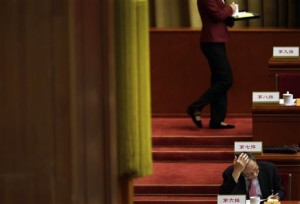Stricter stipulations on food production and operation will be incorporated in China’s revised food safety law to guarantee food safety and safeguard the people’s health, said a legislator of the National People’s Congress in Beijing on Monday.
At a press conference on the sidelines of the ongoing third session of the 12th National People’s Congress, Yuan Jie, head of the administrative law office of the Commission for Legislative Affairs of the NPC Standing Committee, disclosed some content of the second draft of the revised food safety law.
“To [ensure] food safety for the people, the food safety law will have even stricter stipulations with clear citations and requirement on what food safety standards the food production and business operation should go by, with relevant legal liabilities, and on food that is prohibited to produce and sell, also with relevant legal liabilities defined,” Yuan said.
Yuan said that to strengthen regulations on every link in food production and operation is a key point of the revised food safety law.
“The second draft of the revision also incorporates stipulations on strengthening the management on food duration period, further honoring the consumer’s right to know and further protecting the informer to encourage insiders to report violations of food safety and prevent any kind of acts of retaliation,” said Yuan.
China also plans to develop national legislation to fight corruption, according to a report delivered by top legislator Zhang Dejiang on Sunday.
The country will work out revisions to the Law on Administrative Supervision, said Zhang, chairman of the NPC Standing Committee, while delivering a work report at the annual session of the top legislature.
The anti-graft legislation should be introduced as quickly as possible and the system of sanctions and prevention improved with a goal of being a mechanism that means “officials dare not, cannot and do not want to be corrupt,” according to the decision.
Furthermore, the top legislature is mulling harsher punishments for those committing crimes of embezzlement and bribery. Heavier penalties will be imposed on those offering bribes, according to a draft amendment to the Criminal Law submitted to the NPC Standing Committee for a first reading in October last year.
Story compiled with information from Xinhua News and AP reports.
 CGTN America
CGTN America A member of the National Committee of the Chinese People’s Political Consultative Conference reads the work report while a hostess prepares tea for delegates during the plenary session of the Chinese People’s Political Consultative Conference (CPPCC), at the Great Hall of the People in Beijing Monday, March 9, 2015. (AP Photo/Andy Wong)
A member of the National Committee of the Chinese People’s Political Consultative Conference reads the work report while a hostess prepares tea for delegates during the plenary session of the Chinese People’s Political Consultative Conference (CPPCC), at the Great Hall of the People in Beijing Monday, March 9, 2015. (AP Photo/Andy Wong)
